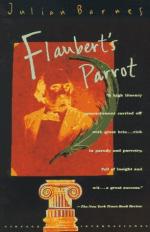|
This section contains 586 words (approx. 2 pages at 400 words per page) |

|
Chapter 5, Snap! Summary
Geoffrey does not like coincidences; he prefers to feel that life is chaotic. If Geoffrey could control all of literary fiction, he would ban coincidences. Geoffrey thinks that one way authors legitimize coincidences is to call them ironies. Geoffrey isn't sure how Flaubert felt about coincidences. The man who prosecuted Madame Bovary was later found to have written a collection of priapic verses. In his private life Flaubert traveled in curtained cabs to avoid the lusty Louise Colet. The very devices that allowed him to avoid sexual encounters, he would use to facilitate Madame Bovary's sexuality. Geoffrey considers some of the other ironies in Flaubert's life.
In Dec. 1849, Du Camp and Flaubert climb the Great Pyramid, after sleeping beside it the night before. At the top, Flaubert notices a business card pinned in place with the name "Humbert, Frotteur" and a...
(read more from the Chapter 5, Snap! Summary)
|
This section contains 586 words (approx. 2 pages at 400 words per page) |

|




